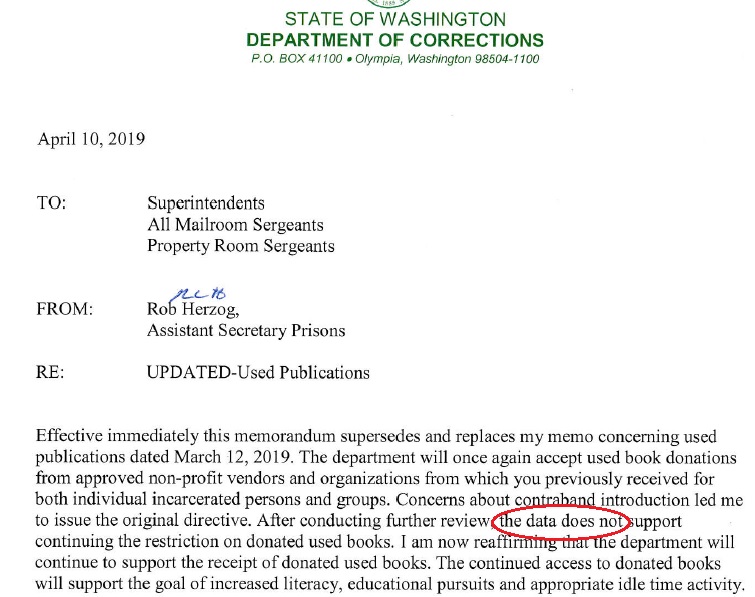In Washington State the courts, legislature, Governor’s office, and public have traditionally deferred to the expertise of state corrections officials in the design and implementation of penological objectives and policy. Correctional expertise—most especially custody expertise—has been perceived as too esoteric and hardcore for the common civilian to have any business questioning. But is there sufficient multidisciplinary expertise in WA DOC to produce positive outcomes for the unique populations under its jurisdiction? And how confident in WA DOC expertise might lawmakers and the public be if they were to scrutinize the agency’s achievements, public reports, signage, and presentations of its own internal data?
Here we present the educational achievements of the WA DOC prisons leadership and Executive Strategy Team, as well as the agency’s goals, performance measures, public data presentations, and other public materials. We focus first and foremost on the educational achievements of the highest ranking local and headquarters Prisons Division staff—the staff who have direct and ultimate decision-making authority over the lives of prisoners, staff, and visitors in WA DOC prisons. In presenting these analyses, we do not intend to assert that prestigious educational achievements necessarily make for excellent correctional leadership and/or management. Indeed, some of the WA DOC secretaries we would count among the most thoughtful and engaged have had relatively humble formal educational achievements, while some with flashier credentials…well…
Indeed, a degree title tells us only that the student passed a bare minimum of required courses and reveals nothing about the student’s grades or mettle. Also worth noting is that the coursework for an advanced degree from a for-profit university may well be less rigorous than that of a bachelor’s program at a state university with proven academic excellence. Nevertheless, what we present here is at least a starting place for discussing what correctional expertise has been, currently is, and could be in Washington State.
- History of Educational Requirements for Correctional Leadership in Washington State
- Methods Used to Assess WA DOC Educational Achievements & Demographics
- Educational Achievements & Demographics of WA DOC Secretaries, 1981–2020
- Educational Achievements & Demographics of WA DOC Prisons Chain of Command
- Educational Achievements & Demographics of WA DOC Executive Strategy Team
- Agency Goals & Performance
- Public Data Presentations & Data Science
- WA DOC Solecisms
History of Educational Requirements for Correctional Leadership in Washington State
An overview of developments in Washington State educational requirements for correctional leadership:
- The 1932 Remington’s Revised Statutes gave the State Board of Control power over state institutions, with members selected by gubernatorial appointment.
- Under the 1955 Session Laws, a certain level of administrative experience was required of correctional leadership; however, no specific degree or education level was required, nor was education level a factor in assessment of experience level.
- In the 1957 Session Laws, Section 1.3 stated that the “director of institutions shall have had at least five years’ institutional experience of a demonstrably successful type in an executive or supervisory capacity in at least one type of large institution set for in RCW 43.28.020,” while Section 15 states: “The supervisor of the division of adult correction shall have had five years’ successful administrative experience in the adult correctional field, at the budget, policy, and administrative level: Provided, That a master’s degree in the field of adult correction shall count for one year of experience and a doctorate degree in the field of adult correction shall count for two years’ experience.” In 1959, this statute was recodified to RCW 72.02.030, but the language did not change for this section.
- In 1970, the passage of RCW 43.20A.030 repealed RCW 72.02.030 and the Department of Social and Health Services (DSHS) became the agency responsible for adult corrections. RCW 43.20A.030 included no specific language regarding an educational requirement for the Secretary of DSHS.
- RCW 43.17.020 currently governs the appointment of chief executive officers of each Washington State department. It does not specify educational requirements for the Secretary of the Department of Corrections.
See our WA DOC history timeline for more context. We thank the librarians of the Washington State Law Library for helping us track down the history for educational requirements of Washington State agency chief executives.
Methods Used to Assess WA DOC Educational Achievements & Demographics
The analyses presented here were carried out in January 2020. Tracking down information on the educational achievements of high-ranking WA DOC local facility and headquarters staff proved challenging in some cases. The information we were able to find comes from the following sources:
- Official WA DOC staff biographies (see facility information for superintendent biographies and WA DOC’s Executive Strategy Team page)
- WA DOC press releases, to include unofficial announcements of employee promotions on social media feeds (Facebook and Twitter)
- Washington State Officer of the Governor press release archives
- WA DOC employee LinkedIn accounts
- Biographies on corrections industry websites:
- Eldon Vail – Corrections .com
- Harold Clarke presenter bio – Center for Correctional Excellence!
- Biographies and obituaries posted by other departments of corrections:
- Obituary of Amos Reed – North Carolina Department of Corrections News
- Biography of Harold Clarke – Virginia Department of Corrections
- Expert testimonies and legislative investigations:
- Amos Reed – Alberti v. Klevenhagen (1987)
- Amos Reed testimony referenced – IN RE: Rodney ALCALA on Habeas Corpus (1990)
- Affidavit of Chase Riveland – Osterback, et al. v. Michael W. Moore, et al. (Prison Legal News)
- Report of Joseph Lehman, Coleman v. Schwarzenegger et al. (2008)
- Witness statements – 2016 Washington State Senate Law & Justice Committee investigation
- News stories:
- Justice Assistance News (archives) – February 1981, Vol. 2, No. 1
- Prison boss meeting staff, overseeing construction. (2006, July 18). The Spokesman-Review.
- McCray, R. (2016, April 29). Solitary Confinement Is Broken, and Prison Guards Are Trying to Fix It. TakePart.
- Jason Bennett Named Superintendent at Olympic Corrections Center. (2017, July 8). Forks Forum.
- Additional sources:
- Portland State University Library’s dissertation repository
- Evergreen Magazine – Spring 2009
- University of Nebraska Omaha – Biography of Harold Clarke
- Doane University news and events archive
We use the Times Higher Education rankings of American colleges and universities to assess the institutions of higher education attended by these WA DOC staff.
Educational Achievements & Demographics of WA DOC Secretaries, 1981–2020
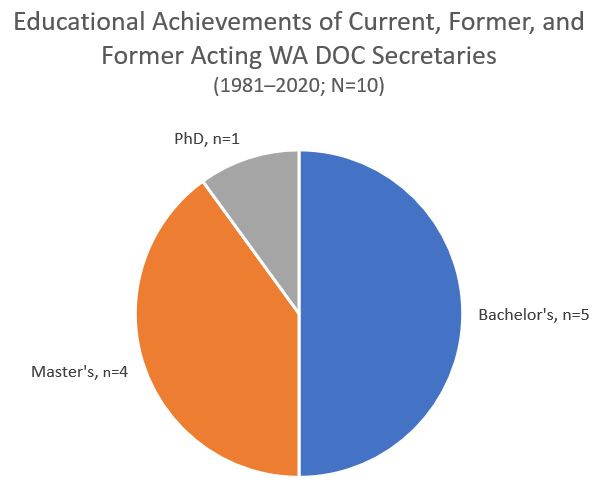
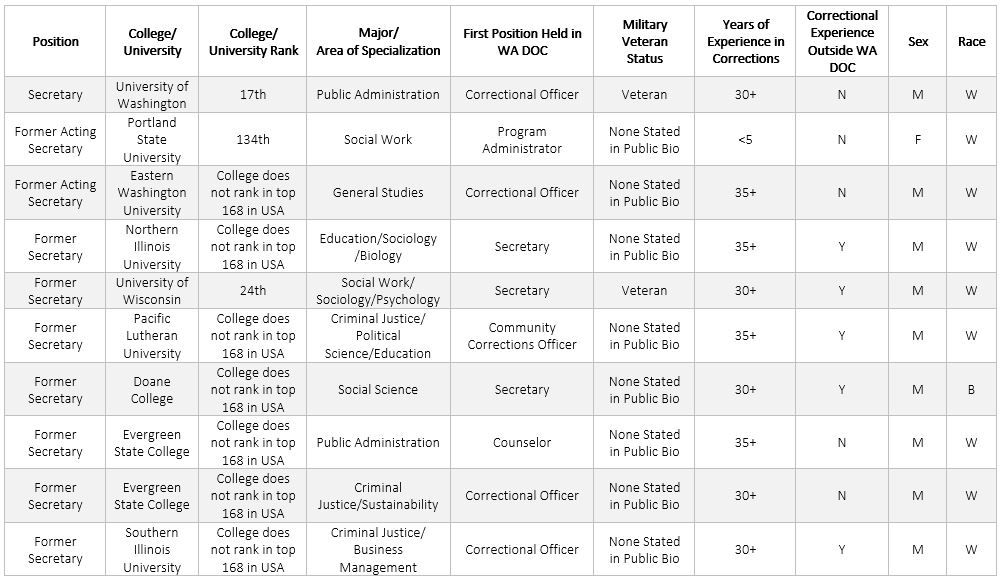
Note: College ranks are from Times Higher Education’s rankings of American universities and colleges
Educational Achievements & Demographics of WA DOC Prisons Chain of Command
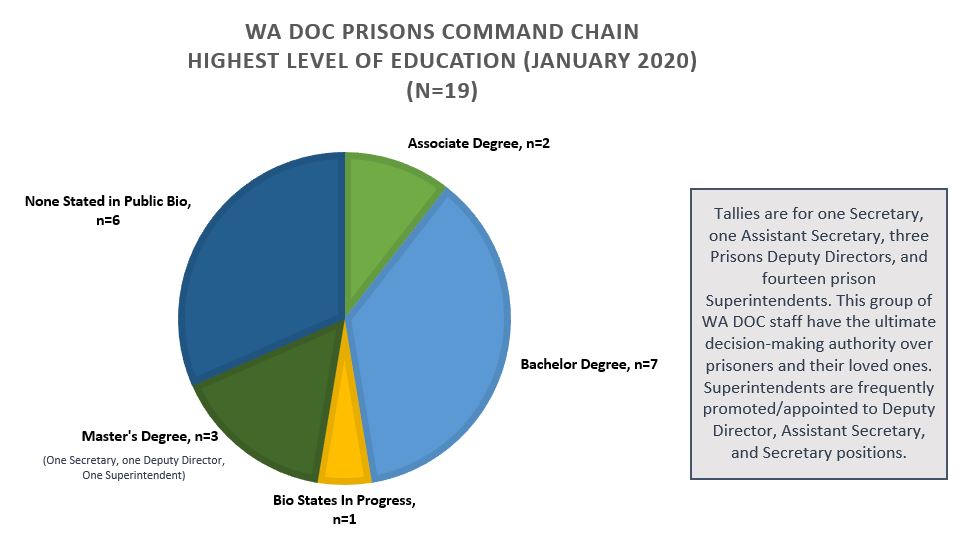
Note that information on WA DOC staff continuing education is not readily available to the public. Also note that as of 2018, the typical salary range from the ranks of superintendent to WA DOC Secretary is $95,000 to $176,000.
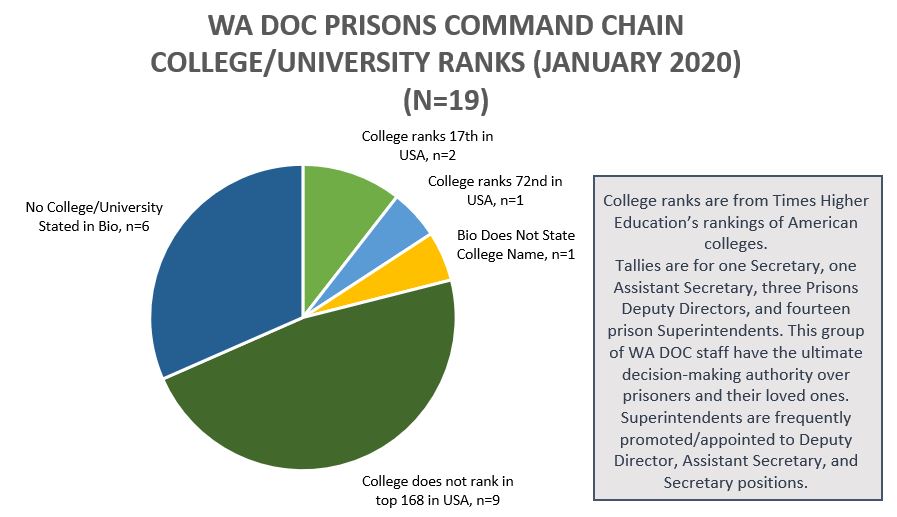
Colleges and universities attended by WA DOC Prisons Command Chain Staff are as follows:
- University of Phoenix (n=2)
- University of Washington (n=2)
- Eastern Washington University (n=1)
- Purdue University Global (n=1)
- Bellevue University, Nebraska (n=1)
- Penn Foster College (n=1)
- Bellevue University, Nebraska (n=1)
- Penn Foster College (n=1)
- Evergreen State College (n=1)
- Peninsula College (n=1)
- University of Cincinnati (n=1)


Additional Expertise and Demographic Information – WA DOC Prisons Chain of Command
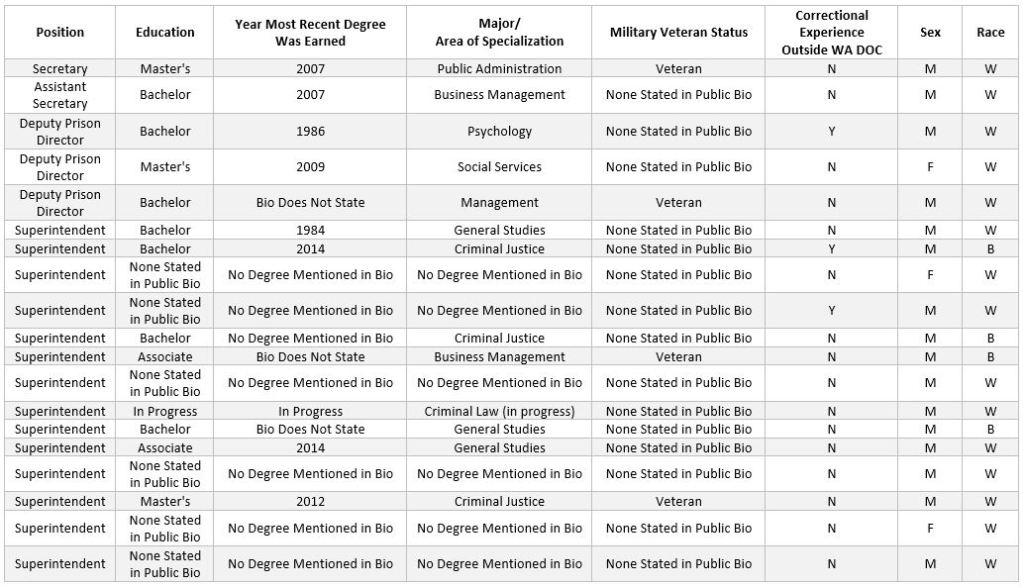
Educational Achievements & Demographics of WA DOC Executive Strategy Team

Colleges and universities attended by WA DOC Executive Strategy Team are as follows:
- University of Washington (n=3)
- Washington State University (n=3)
- Evergreen State College (n=1)
- None Stated in Public Bio (n=1)
- St. Martin’s University (n=1)
- Texas A&M University (n=1)
- University of Kansas (n=1)
- University of Phoenix (n=1)
- Bio does not list college name (n=1)
- Bio does not list college education (n=1)

Additional Expertise and Demographic Information – WA DOC Executive Strategy Team
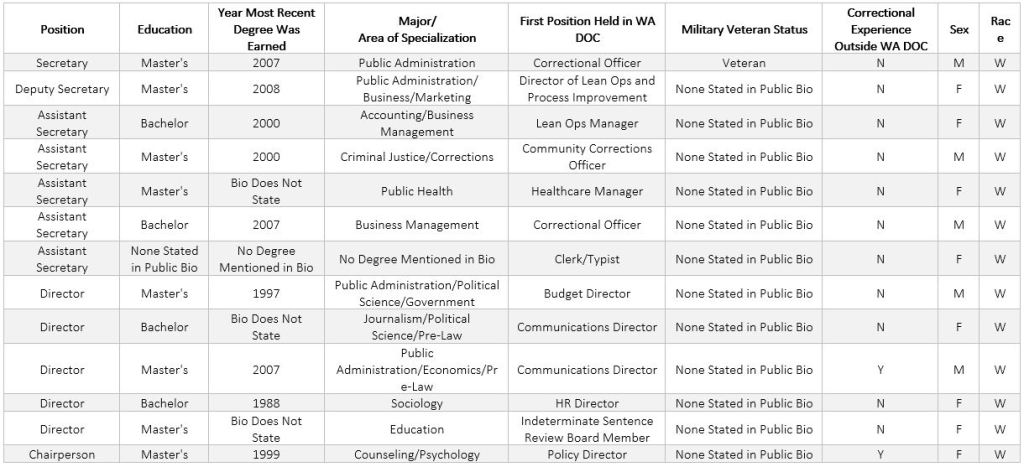
Agency Goals & Performance
- See Facility Operations Reviews & Agency Performance Reports
- Also, see WA DOC’s reports on its own performance in its Strategic Plan Dashboard and WA DOC in the News
Public Data Presentations & Data Science
Here are just a handful of examples to illustrate our concerns about WA DOC data presentations and data science expertise:
- Incorrectly counting respondents’ answers to individual survey questions as individual survey respondents (i.e., conflating response quantity with respondent quantity) and drawing conclusions about entire populations from egregiously insufficient sample sizes (e.g., N = 1) in public presentations of WA DOC data (WA DOC Health Services Patient Satisfaction Survey presentation to the Washington Statewide Family Council, September 28, 2019; see also meeting handout)
- Failing to ensure that participating survey respondents are free from potential external influences that could introduce confounding factors (e.g., 2019 WA DOC Health Services Patient Satisfaction Survey)
- Presenting data summaries in the form of vague pie charts that fail to include all relevant data [see WA DOC’s Offender Betterment Fund‐FY19 Expenditures document presented to the Statewide Family Council on July 13, 2019, noting that pie charts (1) do not distinguish between OBF funds available and OBF funds allocated, (2) do not indicate the percent of OBF funds allocated to crime victims, and (3) are not sufficiently specific about categorization criteria]
- Failing to understand that numerically different measures do not necessarily indicate statistically significant effects (e.g. see WA DOC and Correctional Industries November 2016 Results Washington presentation to Governor Jay Inslee; see also Results WA archived outcome measures)
- Officially implementing the Advance Corrections WA ONE (formerly STRONG-R) pilot risk assessment system before first testing and tracking its recidivism-predicting effectiveness for a sufficient quantity of years, and without accounting for potential biases introduced by poor quality of input data and/or flawed algorithms
- Incorrectly calculating prisoner release dates, to include early releases (see Yarmuth Wilsdon PLLC investigative report) and keeping prisoners past Earned Release Dates (see Prisons Division Performance Report FY 2017–2018)
WA DOC Solecisms
On the off chance that state agency competence in spelling and grammar is of any interest to taxpayers, the Governor’s office, or lawmakers, we present just a handful of available examples of WA DOC solecisms for public scrutiny, with the caveat that there is inherent risk of hypocrisy in doing so; no doubt there are typos or solecisms somewhere on our own website. However, we are a small group of unpaid volunteers with limited resources. We suspect that somewhere in its budget WA DOC has funds for an editor.
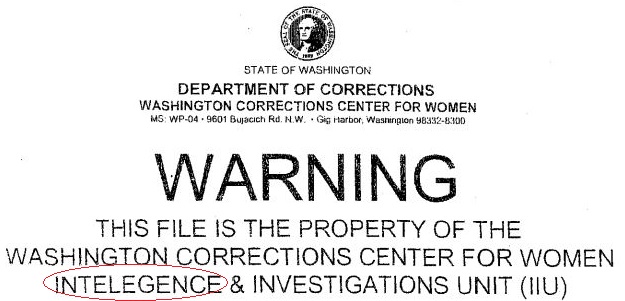
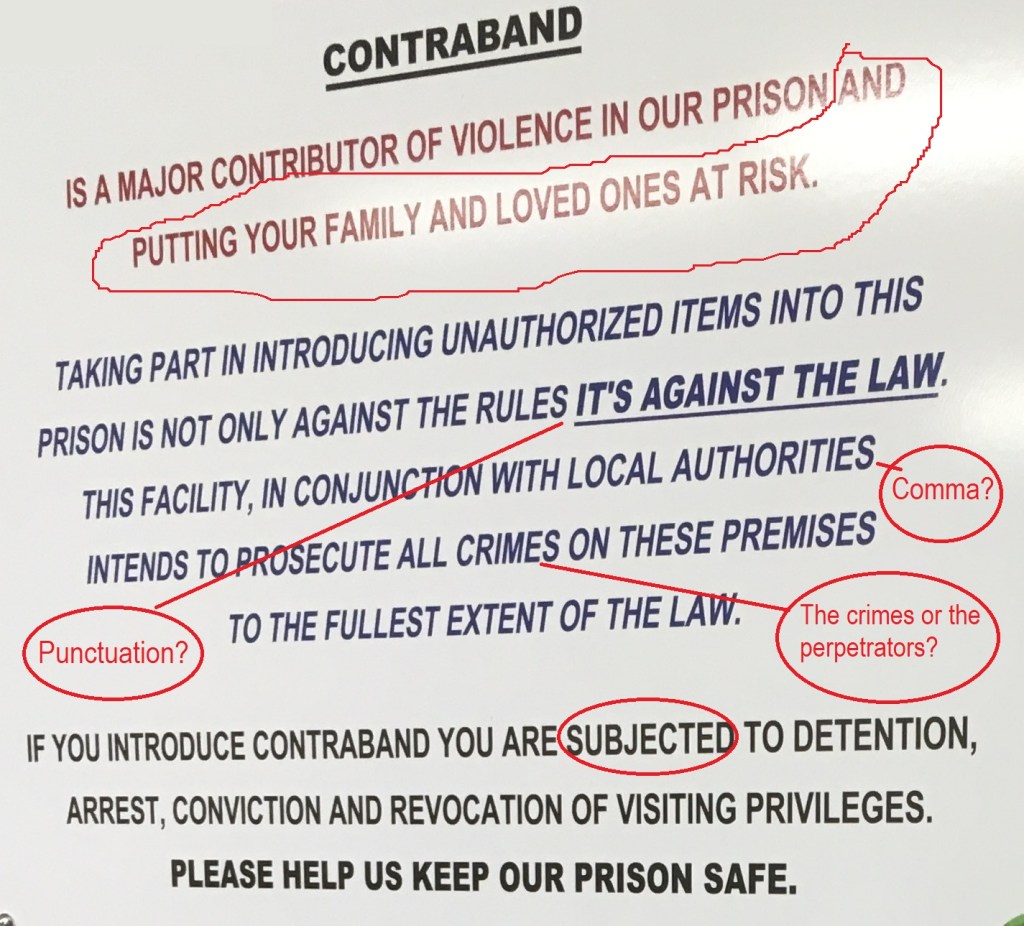


The following solecisms are admittedly made by most Americans, but when a state agency issues publicly posted policy memos or submits formal letters to the courts…well, perhaps we are just being pedantic…
